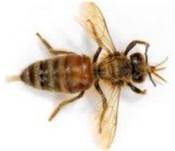Russian Honey
Bee refers to honey bees (Apis mellifera) originated in the Primorsky Krai
region of Russia. This strain of bee was imported into the United States in
1997 by the USDAs Honeybee Breeding, Genetics an Physiology Laboratory in
Baton Rouge, Louisiana in response to severe declines in bee populations caused
by infestations of parasitic mites. Since then they have been used in breeding
programs to improve existing honeybee stock.
Russian Honey
Bees have an innate resistance to various parasitic mites. This strain occurs
in the original native range of the varroa mite, and selective pressure could
have favored bees that exhibited aggressive behavior against colony-level mite
infestations. Accordingly, experimental research has found that mite
populations decline in colonies of pure Russian and of hybrid Russian-Italian
bees. The mechanisms through which mite populations are controlled in these
colonies include hygienic behavior towards mites, and possibly increased
aggression towards mites. Russian stocks also have been shown to resist
infection by tracheal mites.
Russian bees
are actually the product of the U.S. Dept. Of Agriculture's Honey Bee Breeding
Genetics, and Physiology Lab of Baton Rouge, Louisiana. They imported this bee
from the Primorski region of the Sea of Japan because it had survived mites for
150 years. It is not a species but a hybrid.
However; they Produce a lots of propolis, always
seems to have swarm cells in the hive, and they are moderate honey producer.

